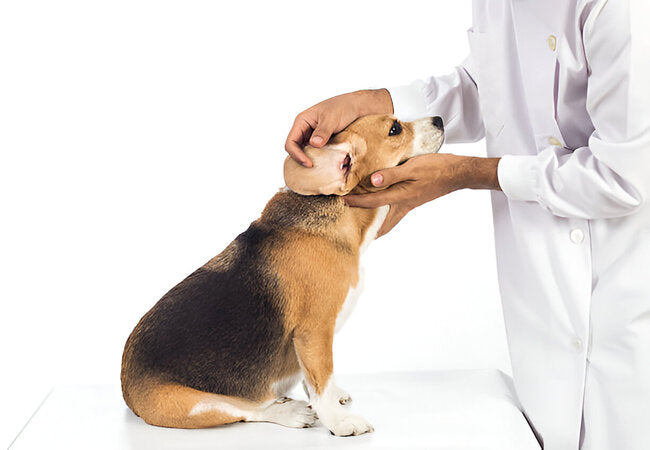2025 Vet Guide: Rhinitis & Sinus Infections in Dogs – Causes, Diagnosis & Care 🐶👃

In this article
2025 Vet Guide: Rhinitis & Sinus Infections in Dogs – Causes, Diagnosis & Care 🐶👃
By Dr. Duncan Houston BVSc
When your pup shows repeated sneezing, nasal discharge, or face rubbing, it's important to understand what's behind those signs. Rhinitis (nasal inflammation) and sinusitis (sinus infection) often go hand-in-hand and can stem from a wide range of causes. This guide helps you navigate the why, what, and how to treat, protecting your dog’s nose, comfort, and overall health. 👇
🔍 1. What Are Rhinitis & Sinusitis?
These terms describe inflammation of the nasal passages (rhinitis) and the sinus cavities (sinusitis). Dogs have intricate nasal structures with turbinates and sinuses that filter and humidify air—but inflammation here causes excess mucus, discharge, and discomfort.
⚠️ 2. Common Causes
- Viruses: Distemper, adenovirus, parainfluenza—most acute rhinitis is viral.
- Bacterial: Often secondary to viruses or irritants—rare alone.
- Fungal: Such as Aspergillus & Cryptococcus—especially in German Shepherds.
- Dental disease: Infected tooth roots (upper teeth) can extend into the sinuses.
- Foreign bodies: Grass awns or dirt lodged in the nasal cavities.
- Allergies: Pollen, mold, dust—causing inflammation and discharge.
- Tumors/polyps: Benign or malignant growths may block drainage.
- Parasites: Nasal mites or bot fly larvae can irritate sinus tissues.
- Immune-mediated: Chronic lymphoplasmacytic rhinitis—cause often unknown.
👃 3. Key Symptoms
- Persistent or intermittent sneezing and snorting.
- Clear to mucoid, purulent, or bloody nasal discharge.
- Facial swelling or pain—especially around sinuses.
- Eye tearing or conjunctivitis.
- Noisy breathing, open-mouth panting.
- Nosebleeds, decreased appetite, lethargy.
🧪 4. Diagnostic Process
- Thorough clinical exam (face, teeth, nasal passages).
- Bloodwork & fungal/viral testing.
- Nasal culture, cytology, or biopsy via rhinoscopy.
- Imaging—X-rays or CT scan for foreign bodies, tumors, bone changes.
- Dental X-rays if tooth involvement suspected.
- Nasolacrimal flush to assess sinus drainage if tear duct involvement suspected.
🛠️ 5. Treatment Strategies
- Viral: Supportive care; secondary infections treated with antibiotics.
- Bacterial: Oral/IV antibiotics; sometimes nebulized or topical.
- Fungal: Topical (clotrimazole lavage for Aspergillus) or systemic antifungals.
- Dental: Tooth extraction + antibiotics.
- Foreign body: Removal under sedation/anesthesia; cleansing.
- Allergy: Antihistamines, steroids, immunotherapy.
- Immune-mediated: NSAIDs, steroids, or immunosuppressants.
- Tumors/polyps: Surgical removal, biopsy, +/- radiation or chemo.
- Parasites: Specific antiparasitic treatment as indicated.
⏳ 6. Prognosis & Follow‑Up
Mild viral or allergy cases often resolve well. However, chronic idiopathic rhinitis, fungal infections, tumors, or dental sinus disease may require long-term therapy, repeat imaging, and supportive care.
🏡 7. At-Home Support
- Use a humidifier to soothe irritated nasal linings.
- Keep environment dust‑free—vacuum regularly and avoid smoke.
- Gently clean nasal discharge using damp cloths to prevent crusting.
- Ensure hydration and soft food to maintain appetite and comfort.
- Observe behavior—track sneezing/discharge using apps like Woopf/Purrz.
- Brush teeth frequently to lower dental-sinus infection risk.
📱 8. Owner Support Tools
- Ask A Vet: Virtual triage, treatment adjustments, and medication guidance.
- Woopf: Log symptoms, treatments, vet visits, and imaging dates.
- Purrz: Track triggers, symptom changes, medication response.
📚 FAQ
Q: Can allergies alone cause sinusitis?
Yes—chronic allergic inflammation can lead to secondary bacterial or fungal infections.
Q: Is fungal sinusitis treatable?
Yes—if diagnosed early. Aspergillosis treatment involves nasal flushing; Cryptococcus may need systemic antifungals.
Q: When should I seek veterinary care?
If:
- Nasal discharge is purulent, bloody, or persistent
- Sneezing or face rubbing continues for >5 days
- Signs of facial pain, swelling, appetite/energy changes
- Nosebleeds occur or breathing becomes noisy
Consult your vet promptly.
💬 Owner Insight
> “Our Lab had chronic sniffles for months until a CT scan showed a hidden tooth root abscess. After extraction and antibiotics, he’s sneeze‑free and happy!”
🏁 Final Thoughts from Dr Houston
Rhinitis and sinus infections in dogs encompass a variety of causes—from simple allergies or viruses to serious dental abscesses, fungal invasion, or tumors. Early detection, targeted diagnostics, and tailored treatment are the keys to recovery. With supportive care at home and tools like Ask A Vet, Woopf, and Purrz, you can safeguard your dog’s breathing, comfort, and quality of life in 2025 and beyond. 💙👃
Download the Ask A Vet app for symptom triage, treatment tracking, and ongoing veterinary support. 📱
AskAVet.com – Clear noses, happy dogs, bright futures.






